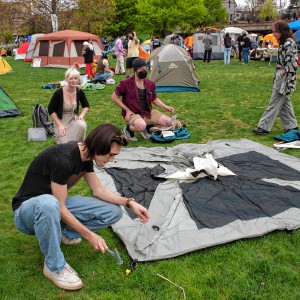A lost macaw, a fretful owner: The search for Munah
| Published: 06-15-2017 11:01 PM |
NORTHAMPTON — Sonia Wilk was polite but frazzled. She hadn’t slept well in days. On Wednesday afternoon, she walked her bike down Conz Street, gripping a weathered stack of leaflets.
She rolled her bicycle into the Fairfield Inn & Suites parking lot, wearing a tie-dye tank top advertising a local day camp, jean shorts and a backpack.
“I sort of try to profile people by how patient they look in this moment,” explained Wilk, 27, who lives in downtown Northampton. “When people sort of seem like they’re in a hurry, they don’t want to talk to me.”
She stopped two hotel guests.
“Hi, excuse me, sorry to bother you,” Wilk said, handing over a leaflet. “This is my pet bird, who’s gone missing.”
Munah is the name of the missing 3½-year-old macaw. The guests were sympathetic, but they had not seen any macaws.
Wilk said Munah is a little bigger than a crow, but with a vibrant green body, white face and maroon and blue streaks on each wing. Wilk headed toward the treeline to call Munah, hoping she would call back.
“I recognize her call,” Wilk said. “I recognize her voice.
Article continues after...
Yesterday's Most Read Articles
 A Waterfront revival: Two years after buying closed tavern, Holyoke couple set to open new event venue
A Waterfront revival: Two years after buying closed tavern, Holyoke couple set to open new event venue
 3-unit, 10-bed house in backyard called too much for Amherst historic district
3-unit, 10-bed house in backyard called too much for Amherst historic district
 The long shadow of the Mill River flood: Multiple events on tap in May to mark 150th anniversary of the 1874 disaster
The long shadow of the Mill River flood: Multiple events on tap in May to mark 150th anniversary of the 1874 disaster
 ValleyBike to roll again by end of May in eight communities throughout Valley
ValleyBike to roll again by end of May in eight communities throughout Valley
 Amherst College store opens downtown in former Hastings space
Amherst College store opens downtown in former Hastings space
 Area property deed transfers, May 2
Area property deed transfers, May 2
“Muuuuunah!” she hollered into the trees, not unlike a mother calling for her child, sun setting and dinner ready. But there was a sense of worry — and no response.
It had been two days.
* * * *
Wilk understands birds and how therapeutic they can be. Before Wilk was born, her father was in a bad car accident. He lost one of his legs.
“Working with birds was really moving for him,” Wilk said. He started with finches, moving to other parrots later, in Clearwater, Florida, where Wilk grew up.
She knows how birds wean and grow, and she knows the dark side of the exotic bird trade, which she looked out for when she bought Munah for $1,000 from the Parrot and Bird Emporium in Feeding Hills three years back.
Now she is most interested in what someone does when or if they spot Munah. She’s received help from 911 Parrot Alert, a website offering resources for owners of lost companion birds. The site has an international database for lost — and found — birds.
“The very first thing is to just call me,” Wilk said, providing her number (727-743-7333). “If they see her, call me and then sit and talk to her.”
She said people who see Munah should then set out a bowl of water for the bird to occupy her, while keeping their eyes on her. If she flies off, Wilk wants to know in which direction to search.
It’s fine to extend a gentle hand to see if she flies over, Wilk said. But don’t stand right under her. And no poles, sticks, ladders or nets.
“All those things will scare her and will immediately make her fly away,” Wilk said. “They are welcome to see if she wants to come over to them,” she said. “She’s very used to being around people. It’s been the longest without her being handled in her life.”
* * * *
In Hebrew, the word “emunah” means to have faith.
“Emunah means saying, ‘Yes, I trust what is going to happen, and I accept what is going to happen,’” said Wilk, who works with area Jewish youth. “Sort of like saying ‘I agree with what’s to come.’”
Wilk said Munah was born in captivity in Georgia 3½ years ago, about the same time Wilk was working with young people at a Jewish retreat center in the Berkshires.
“You can imagine the amount of time that goes into running an overnight program,” Wilk said. “It was very stressful.”
“I was trying to find healthy ways to manage that anxiety,” she said.
Wilk said finding out why she was anxious was a long process, but she was quick to decide a bird could help.
“I was used to birds,” Wilk said.
She wanted a bird that would be flexible with her varied schedule. Adaptable. Affectionate. And large.
“I wanted to feel weight when the bird was on me,” Wilk said.
She put down a $200 deposit at the bird store before Munah even arrived. Normally prospective owners want to meet the birds before they buy — but if Wilk waited too long, she worried the bird might be gone.
“I just needed to have some ‘emunah’ that she was the bird for me,” Wilk said.
Now, more than ever, she reminds herself of why Munah got her name. After Munah arrived from Georgia, Wilk said she visited the bird once a week for several weeks before taking her home.
Munah is now part of the household where Wilk lives on Williams Street with her two roommates. Munah’s cage is in the first-floor living room. Wilk said Munah can tell the difference between the creaks in the doors of Wilk and her roommates. In the morning, she awaits her favorite treat — almonds.
“She knows when I come downstairs to say good morning,” Wilk said. “If she hears my door open, and I go to the bathroom before coming to her, she makes very clear she is waiting for me.”
Munah expects to know details when Wilk leaves the house, her owner says. There’s a difference between “I’ll be back later” and “I’m going to work.”
“If I leave without giving her an almond, and telling her how long I’ll be gone, she screams.”
Munah is easily startled. She can flip when a cellphone rings on TV or when a door slams shut. New things can frighten her.
“Bird psychology is different than mammals,” Wilk said. “Dogs and cats are predators while a parrot is a prey animal.”
So parrots stay alert.
“Their only form of defense is to fly away,” Wilk said.
Which brings us to Sunday evening. Wilk has a covered porch. Out on the porch there is a new, colorful hammock that her roommate recently brought back from Ecuador.
Munah sits on Wilk’s shoulder when Wilk walks the house. On Sunday evening, they made a trip outside.
“She just took off,” Wilk said. “I found her on my neighbor’s roof and hung out with her and called her.”
Munah could not get back. The nearby power lines apparently confused her. She could not figure out how to fly under them. Her neighbor let Wilk climb up his fire escape to get closer to the macaw. But Munah took off, again, overshooting and landing in some nearby trees.
It was getting dark. Munah spent the night outside. Inside, Wilk got little sleep. She left the house before sunrise, looking for her parrot.
“I found her on a pretty low branch in my yard,” Wilk said. She grabbed a chair to try and reach her, but Munah took off, again. Wilk kept her eyes peeled for her bird, and she found her. Munah flew toward her owner but, because she didn’t have experience descending steeper than 45-degree angles, Munah kept overshooting Wilk's hands.
Wilk went back inside to grab some food. She came back out and saw Munah one last time.
“She came flying to me and again flew over my head,” Wilk said, “and at that point, she flew in the direction of where the construction was happening.”
Since then, late Monday morning, Wilk has received reports of three Munah sightings in the area between Pleasant Street and the woods behind Conz Street.
* * * *
“Hey, slow downnn!” Peggy Pesht, curly white hair flowing from beneath a rain cap, shouted at a man speeding in his white sedan down Fruit Street.
“Is that Peggy?” Wilk shouted.
“That’s me!” Pesht shouted back.
Pesht was waiting for her bus. She didn’t recognize Wilk from a distance, but the two attend Congregation B’nai Israel together. Wilk walked closer.
“So, Peggy,” Wilk said. “Have you been hearing things about the congregant with the missing bird?”
“Oh, no, I haven’t,” Pesht said.
The bus pulled up. Wilk pulled out her flier.
“Oh, my God,” Pesht said. “It’s your bird?!”
“It’s my bird,” Wilk said. “It’s my pet. And it’s in this area where she’s been seen.”
“Oh, OK,” Pesht said. “I will definitely look out for her.”
She hopped on the bus.
In a nearby neighborhood cove, Jose Rivera, 52, leaned up against his white pickup truck, jawing with two of his neighbors who were sipping beer.
“I have a cockatiel,” Rivera said. The cockatiel is 8 years old and has lived too long in a cage, he said. “Sometimes I feel like I want to let it go, to fly.
“(But) he don’t know anything,” Rivera said. “It will die outside.”
Rivera told Wilk he would spread the word.
Jack Suntrup can be reached at jsuntrup@gazettenet.com.

 Doors open at Tilton Library’s temporary home at South Deerfield Congregational Church
Doors open at Tilton Library’s temporary home at South Deerfield Congregational Church Pro-Palestinian encampment disperses at UMass, but protests continue
Pro-Palestinian encampment disperses at UMass, but protests continue Amherst council confirms Gabriel Ting as police chief
Amherst council confirms Gabriel Ting as police chief
